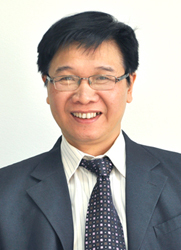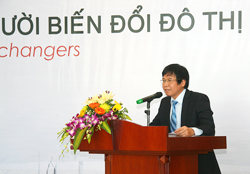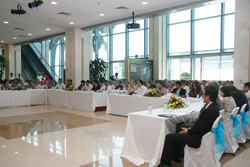Changing cities to build opportunities in Vietnam (1 October 2012)

By Dr. Nguyen Quang - Habitat Programme Manager (UN-Habitat) Event: World Architecture Day - World Habitat Day
According to UN-Habitat's latest report, Asia's urbanisation rate stands at 42.2 per cent, and with its current rapid urban growth, Asia is expected to become urbanised, with over 50 per cent of population living in cities, by the year 2025. This trend shows that urban population will account for two-thirds of the world population within the next two generations.
Vietnam itself is already 30.4% urban, with an urban population of 27% set to reach 50% before 2040. With a GDP growth rate of 12.6%, which accounts for 70% of overall Vietnam's GDP, the urban sector is playing a positive role in the development of the whole economy. However, rapid urbanization also poses challenges for urban living:
- ・Inequality and the income gap between urban and rural and between different classes increase
- ・An average annual rate of about 3% in urban population growth has created a lot of pressure on infrastructure systems and housing.
- ・Industrialization, the boom in construction and the increased use of motorized vehicles has affected the environment in urban areas
- ・The high rate of urbanization which is not associated with sustainable urban planning had led to corollaries, such as the conversion of large amount of agricultural land and lakes into built land which has affected agriculture and food security as well as the ability of urban areas to respond to climate change.
- ・Immigration from rural to urban area has increased need for job creation and development.
Cities are engines of growth, are places where dreams come true. So well-planned cities aimed towards sustainable development, combined with an ability to address the challenges posed by rapid urbanisation will create better opportunities for current and future residents.

Sustainable urban development is comprehensive development, covering six fields so each city based on their conditions and abilities are able to prioritise its development. It can be a resilient city which is adaptable to future demands and risks, and is resilient to the consequences of climate change or natural disasters. It is a green city capable of promoting sustainable development through a carbon efficient built environment. Or a safe and healthy city with livable places which hold the answers to challenges posed by urbanisation, which are in turn inextricably linked to issues of and agendas concerning the economy, climate change, resource consumption, food security and more. An inclusive city can build socially inclusive, accessible, pro-poor, equitable and gender sensitive cities which promotes equitable rights and therefore allow all citizens to partake of the advantages offered by urban habitats. It can be a planned city which ensures the cities of tomorrow incorporate sustainable decision making processes and particular attention to development that balances social, environmental and economic needs. Or its a productive city, making cities more efficient and better places to provide decent employment prospects. Pursuing a sustainable development agenda means planning cities that promote and foster the livelihoods for all citizens through economic opportunities. So we can see that architects play a critical role in planning and constructing Vietnam's cities in the context of aspiring to sustainable development.

In Vietnam, the government issued the Green Growth Strategy 2011-2020, vision of 2050, which stated that: Green growth in Vietnam is a growth model based on the process of changing growth models, restructuring the economy with an aim to fully exploit comparative advantages, increasing economic efficiency and competitiveness through research into and the application of advanced technologies, developing modern infrastructure systems to efficiently use natural resources, reducing greenhouse gas emissions, responding to climate change, contributing to hunger eradication and poverty reduction, and creating the driving force to promote sustainable economic growth.
At the moment, UN-Habitat Vietnam is co-operating with many cities to organise workshops about green growth and eco-city planning to build capacity among local officials in order to involve them in the move towards sustainable urban development.
On World Architecture Day, also World Habitat Day, 1 October 2012, we hope all of us, especially architects, will join to change the cities in which live to make them better cities, providing better opportunities for all residents.
Thank you very much for your attention and participation. I wish you all good health, happiness and success.







